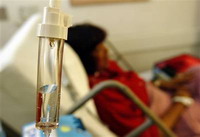Saliva test as new way to discover breast cancer
One more reason to visit a dentist – to have a breast cancer test done.

According to the new study, led by the University of Texas Health Science Center at Houston, breast cancer can be traced down in saliva. The researchers discovered that the appearance of breast cancer changes the mix of proteins secreted by the salivary glands. A person with breast cancer secretes shows a different profile of proteins in comparison with a person without.
The scientists analyzed three pooled (n = 10 subjects/pool) stimulated whole saliva specimens from women. One pooled specimen was from healthy women, another pooled specimen from women diagnosed with a benign breast tumor and the other one pooled specimen was from women diagnosed with ductal carcinoma in situ (DCIS). Differential expression of proteins was measured by isotopically tagging proteins in the tumor groups and comparing them to the healthy control group.
The results of the salivary analyses in this population of patients yielded approximately 130 proteins in the saliva specimens. Forty-nine proteins were differentially expressed between the healthy control pool and the benign and cancer patient groups.
The study suggests that saliva is a fluid suffused with solubilized by-products of oncogenic expression and that these proteins may be modulated secondary to DCIS. Additionally, there may be salivary protein profiles that are unique to both DCIS and fibroadenoma tumors.
The discovery is reported in the 10th January issue of the journal Cancer Investigation.
Why is it convenient to make such a test in the dental office? Because people visit it more often than they ever see the physician. Besides, it’s a quick and safe way of detection.
To detect breast cancer we use nowadays ultrasound, mammograms, biopsies, and blood tests. The researchers hope that one day that list will include salivary diagnostics.
Subscribe to Pravda.Ru Telegram channel, Facebook, RSS!


